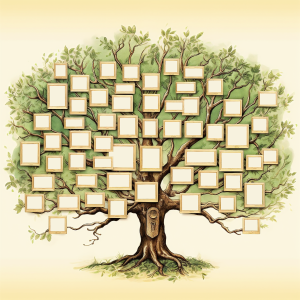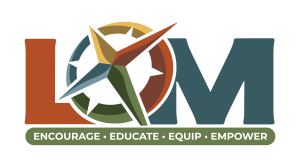Warm-up Questions
- What does “family” mean to you?
- When you think of your family, who immediately comes to mind?
- Are all of these people a genetic or legal relative?
- What makes them your family?
Family (Really) Matters
Family is a common experience for many and a common theme in media. Some people have biological families, others adoptive families, still others chosen families, and yet, all are family. Sports teams talk about one another as families, especially in times of trial. TV shows often focus on the antics of characters navigating the different personalities that other family members’ bring.
This emphasis on family, however, shouldn’t make us think everyone else has a family just like ours. Just because our family relationships are normal to us doesn’t mean that they’re normal for  everyone. Family is unique in its expression, and research shows, in its value during trying times. Not all family trees are defined by the same biological, legal, or emotional connections. Yet, they’re all families.
everyone. Family is unique in its expression, and research shows, in its value during trying times. Not all family trees are defined by the same biological, legal, or emotional connections. Yet, they’re all families.
After the COVID-19 pandemic changed all of our lives, Emory University began to research how that crisis impacted people’s interactions with family members. The results show us something very interesting. When facing difficult situations, people are more likely to reach beyond their resident families–the people with whom they live–and to seek connection with a more extended familial network. In other words, in troubling times, people often look beyond their immediate family for support. You can read more about this study here.
When we think about family, and the importance they play in our lives, this research suggests we shouldn’t just think about the people with whom we live. They’re vitally important. Yet, no matter how you define family, there are others within our family networks that play pivotal roles and share valuable wisdom as we weather the storms of our lives.
Discussion Questions
- During the pandemic lockdowns, who did you reach out to most often for support?
- Do you think of these people as family? Why or why not?
Third Sunday After Pentecost
Text links are to Oremus Bible Browser. Oremus Bible Browser is not affiliated with or supported by the Evangelical Lutheran Church in America. You can find the calendar of readings at Lectionary Readings.
For lectionary humor and insight, check the weekly comic Agnus Day.
Family, Faith, and Function
There is a lot happening in this week’s Gospel. While many readers and preachers may focus on the idea of “unforgivable sin” or imagine what it means to “grieve the Holy Spirit,” its just as striking for some to see Jesus challenge the notion of family. After all, his mother and brothers probably overheard him pose this question as they stood outside! That must have made for an awkward meal at the next holiday.
What Jesus does, though, doesn’t deny that his biological mother and brothers are a part of his family. Instead, he redefines the notion of family away from biology and toward two interrelated things: faith and function. When the people who gather to hear his teaching name the importance of family, Jesus agrees. Yet, he agrees by telling all those gathered in the circle with him that, despite their lack of shared biological parents, those gathered together were his family. Why? Because they gathered around faith in God and they gathered to do God’s work. According to Jesus, “whoever does God’s will” is one of his family members. His biological family was a part of that, but they weren’t the only family, because Jesus was surrounding by a growing movement of people committed to knowing (faith) and doing (function) God’s will.
Across the country this summer, campers from very different backgrounds will come together at Lutheran Outdoor Ministry sites. For some, their ancestors will have attended the same camp. For others, it will be their first time. Some will groups of similarly aged children, while others will be intergenerational camps with youth and adults alike. At camp, you’ll often find people sitting in a circle with fellow campers, just like Jesus was doing in Mark 3, though they’re often around a campfire or singing tree. There they are at Cross Roads in New Jersey, people gathered together in the faith of Jesus. There they are at Living Water Ministries in Michigan, learning about God’s will. There they are El Camino Pines in California, acting out God’s purpose. At these camps, and all of the LOM camps across the country, there’s faith and there’s function. And if we believe Jesus, then there’s family too.
some, their ancestors will have attended the same camp. For others, it will be their first time. Some will groups of similarly aged children, while others will be intergenerational camps with youth and adults alike. At camp, you’ll often find people sitting in a circle with fellow campers, just like Jesus was doing in Mark 3, though they’re often around a campfire or singing tree. There they are at Cross Roads in New Jersey, people gathered together in the faith of Jesus. There they are at Living Water Ministries in Michigan, learning about God’s will. There they are El Camino Pines in California, acting out God’s purpose. At these camps, and all of the LOM camps across the country, there’s faith and there’s function. And if we believe Jesus, then there’s family too.
Of course, this happens at other places beyond camp. In this summer season, camp simply shows what’s possible when God’s people gather in faith around shared activity. Through that holy work, God’s family grows. So who are your mother and brothers? Who is your family? Ultimately, our families are the ones God calls together in faith for sharing works of love in this world.
Discussion Questions
- What is the difference between having faith and acting it out?
- Are you comfortable defining family by faith and function? Why or why not?
- Where do you go, away from home, and feel most connected to people? Why do you think you feel that way?
Activity Suggestions
- Write a note–this could be on paper, via text or email, even on social media DMs–to someone who you consider family. Let them know how much they mean to you. Don’t forget to tell them why they mean so much!
- Challenge yourself to act out God’s love for someone every day this week in a new way. At the end of each day, reflect on whether that changed your connection with the person.
Closing prayer:
God, you are both parent and sibling, and in you we find our family growing ever wider. Help us to appreciate the biological, legal, emotional, social, and spiritual ways we are connected with others. In your love, show us how to love others as the human family and faith family that you have given to each of us. We pray this in your name, Jesus: Amen.
